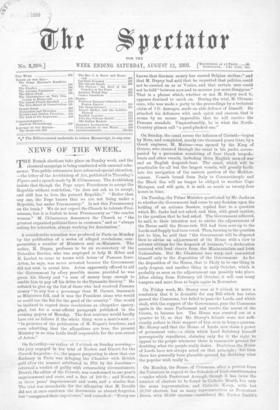On Monday, the House of Commons, after a protest from
the Unionists in regard to the Schedule of Irish constituencies —under which Protestant Armugb, though it has twice the number of electors to be found in Catholic Meath, has only the same representation, and Catholic Kerry, with but 20,700 electors, has as many representatives as Protestant Down, with 38,000 electors—considered Mr. Parker Smith's proposal for abolishing in Ireland the special facilities now given to illiterates for recording their votes. Sir Charles Dilke, supported by Mr. Gladstone, opposed the plan because it had not been made to extend to Great Britain,—a mere technical objection, intended to cover the fact that the Government dare not ask the clericals in Ireland to resign the control of the ehctions given to them by the illiteracy clauses of the Ballot Act. The Unionists were, of course, quite willing to apply their proposal to Great Britain, and only refrained from that course because it would have been out of order. Mr. Rentoul, in the course of the debate, told a story of a poet in his con- stituency who had been forced by the priests to declare him- self illiterate. This may be capped by a still stronger case. A schoolmaster in the South was actually forced to swear that he was unable to read. This story was told to an ardent Nationalist as a good example of an Irish bull. The Nation- alist, however, saw not the comic but the serious side of the transaction, and only replied, " Indeed, then, and they weren't sure of um." Mr. Parker Smith's clause was negatived by 43 (176 to 133).



































 Previous page
Previous page